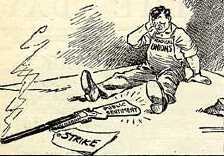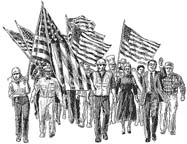 Wages, benefits, and even the existence of the Central American banana unions,
generally considered the region’s strongest private sector unions,
are threatened by a “race to the bottom,”
as companies continue to increase imports from low-wage, non-union Ecuador.
US/LEAP, which is working with banana unions
to develop a strategic response to the industry crisis,
expects this issue to be a top priority in 2001.
Wages, benefits, and even the existence of the Central American banana unions,
generally considered the region’s strongest private sector unions,
are threatened by a “race to the bottom,”
as companies continue to increase imports from low-wage, non-union Ecuador.
US/LEAP, which is working with banana unions
to develop a strategic response to the industry crisis,
expects this issue to be a top priority in 2001.


 We can see at once what kind of portrait is being painted for us
with this “race” and its evocation of dog-eat-dog competition.
We can see at once what kind of portrait is being painted for us
with this “race” and its evocation of dog-eat-dog competition.
 Here are the faceless multinational corporations, concerned only with profit,
abandoning their workers in poor (but unionized) Third World countries
in order to exploit the cheaper (non-union) labor in another,
even poorer Third World country.
The corporations,
which increase their profits by pocketing the money saved on lower wages,
are the undeserving “winners,”
while both the newly unemployed and the newly “exploited” workers
are the unjustly harmed “losers” of this free-market power struggle.
Isn’t this a connect-the-dots case of the rich getting richer
from the poor getting poorer?
Could anyone seriously claim that such a situation in fact benefits everyone?
Here are the faceless multinational corporations, concerned only with profit,
abandoning their workers in poor (but unionized) Third World countries
in order to exploit the cheaper (non-union) labor in another,
even poorer Third World country.
The corporations,
which increase their profits by pocketing the money saved on lower wages,
are the undeserving “winners,”
while both the newly unemployed and the newly “exploited” workers
are the unjustly harmed “losers” of this free-market power struggle.
Isn’t this a connect-the-dots case of the rich getting richer
from the poor getting poorer?
Could anyone seriously claim that such a situation in fact benefits everyone?
 But are the “low-wage, non-union” Ecuadorian laborers
better off working now for some foreign corporation?
Apparently they think so, or else they would have stayed
with what they were doing previously.
(Would you leave your job for one with less pay and worse conditions?)
But are the “low-wage, non-union” Ecuadorian laborers
better off working now for some foreign corporation?
Apparently they think so, or else they would have stayed
with what they were doing previously.
(Would you leave your job for one with less pay and worse conditions?)
 And the union workers in the other Central American countries,
who are losing their jobs to the Ecuadorians—exactly what do they gain from all this?
The answer: employment in those fields where they can better contribute
to what will thus be a more productive economy.
When the blacksmith “lost his job” to the automobile,
he didn’t go without work for the rest of his life.
Instead of working in a smithy,
he now worked in Mr. Ford’s factory—and lived in a world where cars replaced horses.
Unemployment is not eternal.
No one benefits from the idleness of others.
And the union workers in the other Central American countries,
who are losing their jobs to the Ecuadorians—exactly what do they gain from all this?
The answer: employment in those fields where they can better contribute
to what will thus be a more productive economy.
When the blacksmith “lost his job” to the automobile,
he didn’t go without work for the rest of his life.
Instead of working in a smithy,
he now worked in Mr. Ford’s factory—and lived in a world where cars replaced horses.
Unemployment is not eternal.
No one benefits from the idleness of others.
 Although the issue of the “race to the bottom”
is discussed here in the context of foreign trade,
the basics apply equally to the domestic conflict
between strikers and “scabs.”
Again, all people gain when production shifts
from less-efficient to more-efficient workers.
In contrast, who benefits from the high prices and low supplies
that result when government restricts the mobility of capital?
Although the issue of the “race to the bottom”
is discussed here in the context of foreign trade,
the basics apply equally to the domestic conflict
between strikers and “scabs.”
Again, all people gain when production shifts
from less-efficient to more-efficient workers.
In contrast, who benefits from the high prices and low supplies
that result when government restricts the mobility of capital?
 That’s why the activists and company
will demand—on behalf of the union workers—government restrictions
on the importation of bananas from Ecuador,
while the economist will denounce those restrictions as harmful to everyone.
That’s why the activists and company
will demand—on behalf of the union workers—government restrictions
on the importation of bananas from Ecuador,
while the economist will denounce those restrictions as harmful to everyone.
